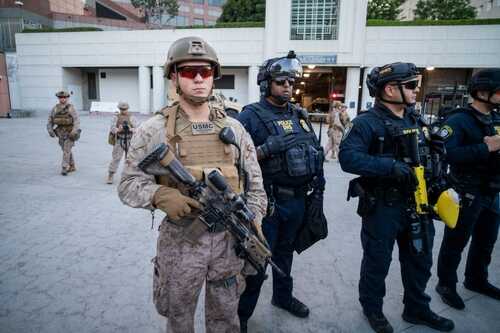(LibertySociety.com) – Three members of Congress, seeking answers about detainee treatment, found themselves literally locked out, and briefly trapped, by masked federal agents in a Brooklyn detention center, raising urgent questions about who’s really in charge behind those gates.
Story Snapshot
- Three Democratic lawmakers were denied entry and temporarily trapped at Brooklyn’s Metropolitan Detention Center on August 6, 2025.
- The confrontation escalates a pattern of federal facilities denying Congressional oversight, especially regarding immigrant detainees.
- Advocates and lawmakers claim such actions undermine constitutional checks and transparency in federal detention operations.
- The incident spotlights growing tension between Congress’s oversight authority and executive branch enforcement power.
Lawmakers Locked Out: An Oversight Showdown in Brooklyn
On the muggy morning of August 6, 2025, Representatives Adriano Espaillat, Nydia Velázquez, and Daniel Goldman stood at the gates of Brooklyn’s Metropolitan Detention Center. Instead of being greeted as constitutional watchdogs, they were rebuffed by masked agents who not only denied them entry but locked the gates behind them, leaving the delegation and their advocates trapped in a narrow space between fence and facility for nearly half an hour. The lawmakers, undeterred, documented the standoff as staff vanished from view, amplifying the sense of official stonewalling.
Democrats attempting to visit Brooklyn ICE facility reportedly ‘trapped’ after being rebuffed by agents https://t.co/rs23ro7Oe9
— Fox News Politics (@foxnewspolitics) August 6, 2025
This standoff was not just a logistical inconvenience. It symbolized a collision between two branches of government, each wielding distinct, sometimes clashing, authority. For Espaillat and Velázquez, this was déjà vu: just weeks earlier, they’d been denied access to an ICE detention area inside Manhattan’s federal plaza. Now, in Brooklyn, the optics were more dramatic and the stakes unmistakably higher. The lawmakers’ attempt to inspect detainee conditions, especially for immigrants, was met with locked gates and silence, fueling accusations that federal agencies are evading oversight and accountability.
Patterns of Denial: When Oversight Hits a Wall
Repeated denials of access are fast becoming a disturbing trend. On June 8, 2025, Representatives Espaillat and Velázquez were rebuffed at the Manhattan ICE facility, allowed into the building, but barred from the actual detention floors. Previous attempts by lawmakers across the country have met similar resistance, particularly as scrutiny intensifies over ICE raids and reports of overcrowding, excessive heat, and unsanitary conditions in federal custody. The Brooklyn MDC, already notorious for high-profile inmates and management controversies, is now the latest flashpoint in a national debate over who polices the jailers.
The broader context is critical: Congressional visits are not mere photo ops. They are an exercise of constitutional duty, a check on the executive branch’s power to detain, deport, and, critics argue, sometimes dehumanize. Immigrant rights groups like the New York Immigration Coalition have seized on these incidents as evidence that lack of transparency enables abuse and erodes public trust. Facility staff and ICE agents, meanwhile, point to security and operational concerns, though critics argue these explanations have become a convenient shield for opacity.
Constitutional Clash and the Battle for Transparency
The core of the controversy lies in the balance of power. Lawmakers, armed with oversight authority, argue that routine denial of access sets a dangerous precedent, one that could embolden executive agencies to operate beyond the reach of democratic scrutiny. As Velázquez remarked in the aftermath, “This is not Russia… The President of the United States is not a king, and we as members of Congress have the duly constitutional responsibility to exercise oversight in a place like this.” Legal scholars echo this concern, warning that continued refusals may lead to court challenges or legislative intervention to reaffirm Congress’s right to inspect federal operations.
Democrats attempting to visit Brooklyn ICE facility reportedly ‘trapped’ after being rebuffed by agents https://t.co/ebTH9Ipz6x #FoxNews
— Joni Myers (@JoniMyers18) August 6, 2025
The immediate fallout is already visible: media and public attention are laser-focused on the growing rift between Congress and federal agencies. Espaillat, channeling the frustration of his colleagues and constituents, pledged to use every tool, potentially including funding threats, to break the impasse. Advocacy groups are ramping up pressure, demanding not just access but a full accounting of conditions inside America’s detention centers.
Ripple Effects: What’s Next for Oversight and Detention Policy?
The implications of the Brooklyn standoff reach far beyond one locked gate. In the short term, it has intensified scrutiny of federal detention practices and sparked fresh debate about the limits of executive power. Lawmakers are openly weighing legislative or legal remedies, and the possibility of sweeping reforms looms. For immigrant detainees, these battles are more than political theater, they are a fight for visibility, dignity, and basic rights. For the broader public, the episode is a window into the high-stakes contest over transparency and accountability at the heart of American democracy.
As this story develops, one fact remains unambiguous: when the doors to oversight are slammed shut, the questions on the other side only get louder. Whether Congress will reclaim its watchdog role, or federal agencies will continue to operate behind locked gates, now sits squarely in the national spotlight.
Copyright 2025, LibertySociety.com .
Click this link for the original source of this article.
Author: Editor
This content is courtesy of, and owned and copyrighted by, https://libertysociety.com and its author. This content is made available by use of the public RSS feed offered by the host site and is used for educational purposes only. If you are the author or represent the host site and would like this content removed now and in the future, please contact USSANews.com using the email address in the Contact page found in the website menu.








